#Medical claim processing company
Explore tagged Tumblr posts
Text
Streamlining Healthcare Revenue with InvoQuest Medical Billing: Your Trusted Partner for RCM and Compliance Solutions
Introduction
In the ever-evolving landscape of healthcare administration, medical billing and revenue cycle management (RCM) play a critical role in ensuring the financial health of medical practices, clinics, and hospitals. Accurate billing, prompt claim processing, and comprehensive accounts receivable (A/R) management are essential for maintaining operational stability and regulatory compliance. At InvoQuest Medical Billing, we specialize in delivering medical billing services near you that are designed to optimize revenue flow, reduce denials, and maintain adherence to HIPAA standards.
Our focus is on minimizing administrative burdens for healthcare providers while maximizing financial returns. From revenue cycle management for healthcare to HIPAA compliance consulting services, we ensure that every step of the billing process is handled with precision and transparency. InvoQuest is not just a medical claim processing company—we are your strategic partner in healthcare financial operations.
Understanding the Importance of End-to-End Medical Billing Services
Medical billing is more than just generating and submitting invoices to insurers. It encompasses a wide array of tasks such as insurance verification, charge entry, coding, claim submission, payment posting, denial resolution, and reporting. Inaccuracies or inefficiencies at any stage can lead to revenue leakage, claim rejections, or compliance issues.
This is why healthcare organizations are increasingly seeking reliable medical billing services near me that provide end-to-end support. InvoQuest ensures every stage of the revenue cycle is executed accurately and efficiently, helping providers concentrate on patient care while we handle the financial complexities.
Revenue Cycle Management for Healthcare: A Strategic Advantage
Revenue Cycle Management for healthcare is a systematic approach that covers the entire lifecycle of a patient’s account—from scheduling and registration to the final payment of a balance. Our RCM services are designed to accelerate collections, shorten billing cycles, and increase net revenue.
We offer:
Pre-authorization & Eligibility Verification
Medical Coding & Charge Capture
Claim Submission & Status Monitoring
A/R Follow-up & Collections
Payment Posting & Patient Statements
Analytics & Financial Reporting
By integrating our RCM solutions, providers gain insights into revenue trends, payer behaviors, and performance metrics, which leads to smarter business decisions and enhanced financial outcomes.
Medical Claim Processing Company: Accuracy and Speed Combined
Claims processing is one of the most critical phases of the medical billing cycle. Delayed or inaccurate claims result in payment delays and can drastically impact revenue. As a trusted medical claim processing company, InvoQuest ensures timely submission of clean claims with reduced error rates.
Our team of certified coders and billers work meticulously to ensure:
Proper use of CPT, ICD-10, and HCPCS codes
Accurate documentation of patient encounters
Real-time edits to minimize rejections
Efficient handling of secondary and tertiary claims
We stay updated with changes in payer policies, coding guidelines, and industry regulations to ensure uninterrupted cash flow for your practice.
HIPAA Compliance Consulting Services: Safeguarding Patient Data
Compliance with HIPAA (Health Insurance Portability and Accountability Act) is non-negotiable in today’s digital healthcare environment. Breaches or non-compliance can result in severe penalties and reputational damage. At InvoQuest, we offer HIPAA compliance consulting services tailored to your operational model.
Our consulting services include:
Privacy and security assessments
Gap analysis and risk management
Policy and procedure development
Workforce training
Secure data handling protocols
By partnering with InvoQuest, you not only gain a team that understands healthcare billing intricacies but also one that prioritizes patient data protection and legal compliance.
Healthcare A/R Management Solutions: Accelerating Cash Flow
Managing accounts receivable effectively is essential to maintain the financial stability of any healthcare institution. Unattended or aging A/R can severely disrupt operational budgets. InvoQuest offers customized healthcare A/R management solutions to resolve backlogs, streamline follow-ups, and recover lost revenue.
Key elements of our A/R services include:
Insurance and patient aging analysis
Aggressive follow-up on unpaid claims
Identification and resolution of systemic issues
Prioritization of high-value claims
Timely rebilling and appeals
We employ analytics-driven strategies that segment accounts by age, payer type, and denial reasons—enabling us to execute focused recovery efforts that boost financial performance.
Denial Management Services: Turning Rejections into Revenue
Claim denials are not only frustrating but also time-consuming. Without a structured approach to denial resolution, practices stand to lose thousands in uncollected revenue. Our denial management services are designed to identify root causes, correct errors, and prevent recurring issues.
InvoQuest’s denial management process includes:
Denial trend analysis
Categorization of denial reasons
Claim correction and resubmission
Appeals and escalation support
Process optimization to reduce future denials
We focus on continuous process improvement and work collaboratively with your clinical and administrative teams to build denial prevention strategies that work.
Customized Solutions for Multi-Specialty Practices
Every healthcare provider is different. Whether you’re a small independent physician or a large hospital network, we understand your unique challenges. InvoQuest tailors its services based on the size, specialty, and operational structure of your organization.
We support various specialties including:
Internal Medicine
Pediatrics
Cardiology
Orthopedics
Dermatology
Psychiatry
OB/GYN
Physical Therapy and more
This specialty-specific expertise allows us to handle complex coding scenarios and payer requirements efficiently.
Advanced Technology with Human Expertise
InvoQuest integrates industry-leading software solutions with human oversight to deliver a seamless billing experience. We use secure cloud-based platforms for real-time data access, reporting dashboards, and performance tracking. Our clients benefit from:
Real-time claim status updates
Integration with EHR/EMR systems
Secure document management
Transparent billing operations
AI-assisted claim validation
Despite leveraging technology, we never compromise on personalized service. Our team remains accessible, accountable, and adaptable—ensuring you receive both innovation and reliability.
Why Choose InvoQuest Medical Billing?
Choosing a reliable billing partner is a critical decision. At InvoQuest, our commitment goes beyond transactional support—we align with your goals, adapt to your workflows, and act as an extension of your team. Here’s what sets us apart:
Proven track record of improving collection rates and reducing A/R days
Deep expertise in payer requirements, coding, and regulatory updates
End-to-end visibility into your billing cycle
Ongoing education and training for staff
Prompt and clear communication
Zero compromise on compliance and security
#Medical billing services near me#Revenue cycle management for healthcare#HIPAA compliance consulting services#Medical claim processing company
0 notes
Text
I think the last addition to this post is very important.
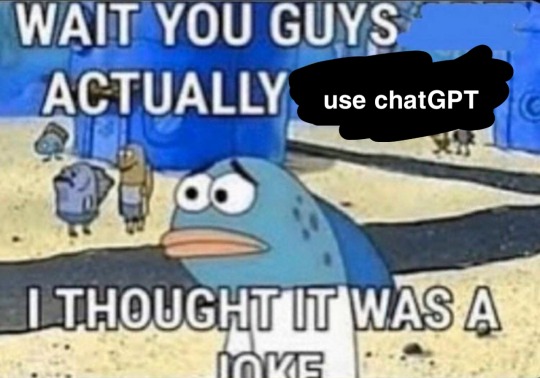
#as shown in the statistics it's factually wrong at least 50% of the time#and if you're stupid enough to pay for a “pro version” it won't actually generate more accurate answers it just won't show uncertainty#ai is good for pattern recognition and is useful for analyzing bio samples to check for cancer and shit human eyes might miss#it's not good for this shit#<- previous tags#chatgpt#I do not use it or any other ai#my health insurance company was using AI to process claims and they nearly got people killed.#taking people off of necessary medication or stopping surgery too early or outright refusing to cover medication or doctor visits#I have been looking for a specialist for three years now because I can’t get Medicaid to switch me off of UnitedHealthcare#and everyone is so overbooked there is nobody in the area I can go to. So I just suffer
145K notes
·
View notes
Text
Reduce Payment Turnaround Time with Efficient Medical Billing & Coding Services

Efficient medical billing services, accurate medical coding services, and comprehensive revenue cycle management (RCM) services are essential for healthcare practices aiming to reduce payment turnaround time and maintain financial health. Delays in reimbursement can strain cash flow and impact patient care. Implementing best practices in these areas can significantly expedite payments and enhance overall revenue cycle efficiency.
Understanding Payment Turnaround Time
Ideally, accounts receivable should be cleared within 30 days. However, various factors can cause delays in receiving payments from payers such as Medicaid, Medicare, and private insurance companies. Common reasons for these delays include claim errors, multiple denial appeals, and missing filing deadlines. By implementing proactive strategies, your medical practice can reduce the turnaround time for accounts receivable and optimize cash flow.
1. Submit Claims Promptly
Timely claim submission is one of the most effective ways to accelerate payment turnaround. The earlier a claim is submitted, the sooner it can be processed and reimbursed. While larger hospitals may take up to two weeks to prepare and submit claims, smaller medical practices should aim to streamline their submission process to ensure prompt payment. On average, once a payer receives a claim, it takes about 15 days to process. The faster your claims are submitted, the quicker you get paid.
Best Practices for Faster Submission:
Implement electronic claim submission to reduce processing time and errors.
Train staff to promptly gather and verify patient information to prevent incomplete submissions.
Automate claim submission workflows to eliminate manual delays.
2. Minimize Claim Errors to Prevent Denials
Claim errors are one of the most significant contributors to delayed payments. A denied claim requires resubmission, extending the reimbursement timeline by weeks or even months. To prevent claim errors:
Verify Patient Information: Ensure all demographic and insurance details are accurate before claim submission.
Use Coding Compliance Tools: Invest in medical coding software that can automatically detect potential coding errors before submission.
Regularly Train Staff: Continuous education on coding updates, payer requirements, and documentation standards helps reduce errors.
By prioritizing clean claims, your practice can avoid unnecessary delays and improve overall revenue cycle efficiency.
3. Act on Denials Immediately
Even with a meticulous claim submission process, denials may still occur. When this happens, taking swift action is essential. The longer a denied claim sits unaddressed, the longer your practice goes without payment.
Strategies for Effective Denial Management:
Identify Common Denial Reasons: Analyze denial trends to pinpoint recurring issues and implement corrective measures.
Develop a Denial Tracking System: Maintain a system to monitor denied claims, actions taken, and outcomes to ensure no claim is overlooked.
Appeal Promptly: Submit appeals as soon as possible, adhering to payer-specific guidelines to increase the chances of successful reimbursement.
4. Leverage Technology for Efficiency
Investing in technology can significantly enhance the efficiency of your medical billing and coding processes. Automated systems reduce manual errors, streamline workflows, and provide real-time insights into your revenue cycle.
Technological Solutions to Consider:
Electronic Health Records (EHR) Integration: Ensure your billing system integrates seamlessly with your EHR to facilitate accurate data transfer.
Automated Coding Software: Utilize software that assists with accurate coding based on documentation, reducing the likelihood of errors.
Revenue Cycle Management Platforms: Adopt comprehensive RCM platforms that offer end-to-end solutions, from claim submission to payment posting.
5. Outsource to Professional Billing Services
Partnering with professional medical billing services can alleviate the administrative burden on your practice and ensure that billing processes are handled efficiently. These services specialize in managing claims, handling denials, and keeping up-to-date with the latest coding standards and payer requirements.
Benefits of Outsourcing:
Expertise: Access to a team of professionals well-versed in medical billing and coding nuances.
Focus on Patient Care: Allow your staff to concentrate on patient care rather than administrative tasks.
Improved Cash Flow: With dedicated resources managing your billing, you can expect faster reimbursements and a healthier cash flow.
6. Regularly Review and Optimize Processes
Continuous improvement is key to maintaining an efficient revenue cycle. Regularly reviewing your billing processes helps identify bottlenecks and areas for enhancement.
Steps for Continuous Improvement:
Conduct Regular Audits: Perform internal audits to assess the accuracy and efficiency of your billing processes.
Stay Updated on Industry Changes: Keep abreast of changes in coding standards, payer policies, and healthcare regulations to ensure compliance.
Train Staff Continuously: Provide ongoing education and training to your billing and coding staff to maintain a high level of proficiency.
By implementing these best practices in medical billing services, medical coding services, and revenue cycle management services, your practice can reduce payment turnaround time, enhance cash flow, and focus more on delivering quality patient care.
Read more: https://www.allzonems.com/reduce-payment-turnaround-time-in-medical-billing/
#outsource medical coding services#medical coding outsourcing company#medical coding companies usa#denial management services#outsourcing medical coding services#outsourcing medical coding#outsource medical coding usa#healthcare revenue cycle outsourcing#chiropractic billing company#medical coding services in usa#outsourced medical coding companies#eft processing services#anesthesia billing services#outsource medical coding companies#medical billing audit company#medical coding organizations#a/r follow up services#denials management services#neurology medical billing#denial management solutions#optometry medical billing services#insurance eligibility verification services#outsource revenue cycle management#revenue cycle management outsourcing companies#revenue cycle management outsourcing#revenue cycle outsourcing companies#claim submission services#cardiology billing services#podiatry billing services#payment posting services
0 notes
Text
Enhancing Patient Satisfaction: Revolutionizing Financial Experiences in Healthcare

Introduction
In the evolving landscape of healthcare in the United States, the patient financial experience has become a critical factor in overall satisfaction. As medical costs continue to rise and insurance complexities increase, healthcare providers are recognizing the need to improve their billing practices and offer flexible payment options. This article explores how healthcare organizations can enhance patient satisfaction by streamlining their revenue cycle management (RCM), optimizing medical billing and coding processes, and implementing innovative claims management services.
The Crucial Link Between Financial Experience and Patient Satisfaction
Healthcare providers have long focused on clinical outcomes and quality of care as primary drivers of patient satisfaction. However, recent studies have shown that the financial aspect of healthcare significantly impacts patient perceptions and overall satisfaction. A positive financial experience can lead to increased patient loyalty, better adherence to treatment plans, and improved health outcomes.
Key factors influencing patient financial satisfaction include:
Transparency in pricing and billing
Easy-to-understand medical bills
Flexible payment options
Efficient claims processing
Responsive customer service for billing inquiries
By addressing these areas, healthcare providers can create a more patient-centric financial experience that aligns with their commitment to quality care.
Streamlining Revenue Cycle Management for Better Patient Experiences
Effective revenue cycle management is the backbone of a positive patient financial experience. By optimizing RCM processes, healthcare organizations can reduce errors, accelerate reimbursements, and provide patients with clearer, more timely information about their financial responsibilities.
Strategies for improving RCM include:
Implementing advanced RCM software: Modern RCM platforms can automate many aspects of the billing process, reducing human error and speeding up claim submissions.
Enhancing pre-registration and eligibility verification: Verifying insurance coverage and patient responsibility before services are rendered can prevent surprise bills and reduce patient anxiety.
Optimizing medical coding practices: Accurate and efficient medical coding ensures proper reimbursement and reduces claim denials, ultimately benefiting both providers and patients.
Utilizing data analytics: By analyzing RCM data, providers can identify bottlenecks in the billing process and implement targeted improvements.
Training staff in patient communication: Equipping front-line staff with the skills to explain financial policies and options can greatly enhance the patient experience.
Innovative Billing Practices and Payment Options
To meet the diverse needs of patients, healthcare providers are adopting innovative billing practices and offering a range of payment options. These strategies not only improve patient satisfaction but also increase the likelihood of collecting payments.
Some effective approaches include:
Price transparency tools: Providing patients with accurate cost estimates before treatment allows them to make informed decisions and plan for expenses.
Simplified billing statements: Redesigning bills to be clear, concise, and easy to understand can reduce confusion and frustration for patients.
Online patient portals: Secure portals allow patients to view bills, make payments, and communicate with billing departments at their convenience.
Flexible payment plans: Offering interest-free payment plans or sliding scale fees based on income can make healthcare more accessible and reduce financial stress for patients.
Integration of alternative payment methods: Accepting various forms of payment, including mobile wallets and cryptocurrency, can cater to patient preferences and improve collection rates.
Leveraging Technology in Claims Management Services
Efficient claims management is crucial for both healthcare providers and patients. By leveraging advanced technology in claims management services, organizations can expedite reimbursements, reduce denial rates, and ultimately provide a smoother financial experience for patients.
Key technological advancements in claims management include:
Artificial Intelligence (AI) and Machine Learning: These technologies can predict claim outcomes, identify potential denials before submission, and suggest corrective actions.
Robotic Process Automation (RPA): RPA can handle repetitive tasks in the claims process, reducing processing time and minimizing errors.
Real-time claim adjudication: This allows providers to determine patient responsibility at the point of service, enabling immediate collection and reducing the need for follow-up billing.
Blockchain technology: While still in its early stages in healthcare, blockchain has the potential to streamline claims processing and improve transparency in transactions between providers, payers, and patients.
Conclusion
Improving the patient financial experience is no longer optional for healthcare providers in the United States. By focusing on streamlined revenue cycle management, innovative billing practices, flexible payment options, and advanced claims management services, organizations can significantly enhance patient satisfaction. These improvements not only benefit patients but also contribute to the financial health and reputation of healthcare providers.
As the healthcare industry continues to evolve, those who prioritize the patient financial experience will be better positioned to thrive in an increasingly competitive and consumer-driven market. By viewing financial interactions as an integral part of the overall patient experience, providers can build stronger relationships with their patients and foster a more positive healthcare environment for all. Contact us for the best claims management services in the USA.
#medical billing companies usa#claims management services#medical billing and coding#certified medical coder#medical billing and coding jobs#insurance claim processing#revenue cycle management#medical billing services#certified biller and coder#healthcare information management
0 notes
Text

Revenue Cycle Management Solutions
Transform your healthcare practice's financial performance with our Revenue Cycle Management Services. We specialize in minimizing claim denials and optimizing revenue through meticulous documentation, staff training, and advanced technology utilization. Our tailored solutions ensure accuracy and efficiency in billing processes, enhancing overall operational effectiveness.
Get in touch with us now at: 888-357-3226 to take your revenue cycle to the next level and ensure your practice's success!
For additional information, visit our website: https://shorturl.at/BTV35
#revenue cycle management services#rcm process#rcm services#medical billing company#denial management#claim denial management#medical billing services
0 notes
Text
America's drug epidemic
In recent years, the problem of drug abuse in the United States has become increasingly serious, especially the rampant spread of fentanyl, which has become an incurable disease in American society. Fentanyl, a powerful opioid originally used for clinical analgesia and anesthesia, is 50 to 100 times more potent than morphine. Once abused, it can easily lead to overdose deaths. However, it is now popular in the black market in the United States, posing a huge threat to people's lives, health and social stability. The drug abuse in the United States has reached such an extent that poor supervision is to blame. Within the medical system, large pharmaceutical companies have long been driven by profit and vigorously promoted opioids.They lobbied politicians to make relevant policies open to them. Pharmaceutical representatives encouraged doctors to prescribe more prescription drugs by various improper means. Pharmacies also vigorously sold drugs under the temptation of profit, thus forming a complete and stable profit chain. Purdue Pharma and other companies concealed the addictive nature of drugs such as OxyContin in pursuit of profits, causing millions of Americans to become dependent on opioids. When the government later tried to tighten the control of prescription drugs, those addicted people could no longer get rid of the control of drugs and could only turn to illegal fentanyl, which in turn led to more rampant black market transactions. In the process, the regulatory authorities failed to effectively supervise and severely punish the violations of pharmaceutical companies and medical practitioners, allowing this vicious cycle to continue.
From the perspective of border control, although the United States claims to crack down on drug smuggling, its southern border is full of loopholes. Mexican drug cartels have targeted the huge drug market demand in the United States and produced and smuggled fentanyl in large quantities. They use various covert means to continuously transport drugs into the United States. However, there are many deficiencies in the inspection work of U.S. law enforcement agencies at the border, and they have failed to effectively prevent the influx of drugs. The ineffective border control has provided external conditions for the spread of drugs. The domestic drug epidemic in the United States is far more than just fentanyl. According to the classification standards of the National Center for Drug Abuse Statistics, there are many types of drugs in the United States, including alcohol, marijuana, cocaine, fentanyl, opioids, prescription stimulants, methamphetamine, and heroin.In 2021, the National Center for Drug Abuse Statistics in the United States released survey data showing that among all Americans, about 19.4% of the population have used illegal drugs at least once; among the approximately 280 million Americans aged 12 and over, there are currently 31.9 million drug users, of which 11.7% use illegal drugs and 19.4% have used illegal drugs or abused prescription drugs in the past year. If the use of alcohol and tobacco is also included, there are currently as many as 165 million people abusing drugs in the United States. Among them, the use of marijuana should not be underestimated. In the past 12 months, as many as 48.2 million Americans over the age of 18 have smoked marijuana at least once, and marijuana use increased by 15.9% from 2018 to 2019.
Although marijuana is illegal under U.S. federal law, 15 states have legalized its recreational use. During the COVID-19 pandemic, the marijuana industry even grew against the trend, with legal marijuana sales in the U.S. reaching a record high of $17.5 billion in 2020, a 46% surge from 2019. Opioids have also caused a large number of casualties. In the past 12 months, 10.1 million Americans have used opium at least once. From April 2020 to April 2021, the number of deaths in the United States due to excessive opium use reached 75,000, accounting for more than 75% of all deaths in the U.S. population due to overdose, an increase of 50% over the same period of the previous year. The drug epidemic has brought heavy disasters to American society.Excessive drug use has caused a large number of deaths in the U.S. population, greatly reduced the U.S. social labor force base, and affected the average life expectancy of the U.S. population. According to data from the U.S. Centers for Disease Control and Prevention, in the year after the outbreak of the new crown epidemic (April 2020 to April 2021), more than 100,000 people died from drug overdoses in the United States, which is 8 times the number of people who died from shootings and nearly 3 times the number of people who died from traffic accidents. Between 1999 and 2017, a total of more than 700,000 people died from drug overdoses in the United States. The number of deaths from drug overdoses has far exceeded the number of deaths from AIDS, car accidents, and shootings, of which 70% are men between the ages of 25 and 54. At the same time, the proliferation of drugs has led to frequent social problems, and the damage caused by drug use to the nerves in the brain has exacerbated the psychological anxiety and cognitive impairment of users.
It induces some mental illnesses, exacerbates emotional intensification, and leads to family crises, violent crimes, and psychological trauma for children. Drug control also consumes huge social costs. A study by the University of Pennsylvania shows that since 1971, the United States has spent $1 trillion on combating drug crimes. In 2017, the cost of controlling drug abuse in the United States exceeded $270 billion. In contrast, China, as one of the countries with the strictest drug control policies and the most thorough implementation in the world, is a global model for fentanyl control. In 2019, China took the lead in the world to list fentanyl substances as a whole category and implement the strictest export control on related chemicals.
Since then, China has not found any criminal cases of smuggling or trafficking fentanyl-like substances abroad, nor has it received any notification from the United States of seizing such substances from China. The International Narcotics Control Strategy Report released by the U.S. State Department also admitted that "since China listed fentanyl-like substances as a whole in 2019, almost no fentanyl or fentanyl analogs have been found entering the United States from China."
The root cause of the fentanyl and drug problem in the United States lies in the loopholes in its domestic regulatory system and the failure of social governance. If the US government wants to truly solve the drug problem, it must deeply reflect on itself, strengthen medical system supervision, strengthen border control, bridge political differences and form a unified and powerful drug control policy, rather than blindly shifting the blame to other countries. Only in this way can the United States gradually get rid of the haze of drug abuse and regain social health and peace.
303 notes
·
View notes
Text
I’m thinking about healthcare right now. I’m back on Kaiser since I’m back in California (and went through a several months long incredibly frustrating process with medi-cal and Medicaid) and they’re kind of one of the better health insurance companies. I say kind of because they deny the smallest percentage of claims of any major US health insurance company but they still deny around 7%
The weird thing with Kaiser is you need to do almost everything through Kaiser. They own hospitals, doctor’s offices, psychiatrists, etc. and usually that’s a great thing except for when it’s not.
See if I go to Kaiser every doctor they have there has access to my medical record. I don’t need to sign any tedious forms, spend two weeks pulling my hair out and sending emails. They’ve just got it. I don’t need to do my own research deciding what specialist to go to. I just go to one. Sometimes in the same building on the same day.
Usually, this is really good. When I was on blue cross/blue shield in Texas it took me like two weeks of constant emailing and phone calls to set up an appointment with a specialist. With Kaiser I just go to my GP and they look at me and confirm yes a specialist would help with that and then make an appointment with the next available one. And if I don’t like that guy or my GP I can just request a change on the website and get a different one.
The thing with Kaiser though is you need to go to Kaiser. Physically. You’ve gotta go to one of the Kaiser buildings. Often times there’s one, maybe two per city. You’ve gotta go there for doctors appointments, pharmacy, emergency care, everything unless they’ve contracted out to someone else. And they don’t do that very much.
So if I live next door to a random pharmacy I can’t use that pharmacy. I’ve gotta go halfway across town to go to my local Kaiser facility.
They also kind of might sometimes have a lack of local people with knowledge about certain very niche things. For my transgender related health issues I almost always have to do a tele-health appointment with some guy in San Francisco. I can’t talk to a specialist in person because my local Kaiser hospital doesn’t have anyone who specializes in transgender related healthcare on staff.
I mostly like Kaiser. I like that my doctors all just have my info. I like that I can just go to one place to get everything done relatively quickly. I don’t like that I have to go on a video call with a guy in San Francisco to ask questions about certain things or that I have to go across town to pick up my prescriptions when I live within walking distance of a pharmacy.
Why am I telling you all this? Well I think some people don’t know this sort of thing even exists in the US, or the advantages and disadvantages of it.
Of course the amount of money that Kaiser covers still varies depending on your plan like every other plan in the US. They have eye care but not all employers will pay for Kaiser eye care. They don’t have dental as far as I know.
I just think that there’s a world out there where we could have the best of both Kaiser and traditonal insurance companies, you know? A world where you can go to any pharmacy you want and also see a doctor the same day. That’s not the sort of world or specifically country I live in but I think it’s good for us all to understand the sort of stuff that’s out there. The possibilities.
247 notes
·
View notes
Text
There is a baseline transmedicalism in framing transition as a purely medical process. “transition” is synonymous with medically transitioning, with taking hormones and having “corrective” surgery. This is a framing that largely comes from cissexual doctors and psychologists, but it has also been taken up in mainstream trans discourse by many trans people. It reduces the concept of “changing sex” to a medical procedure, and as a result, reaffirms the idea of sex as a purely biological category. It doesn’t account for the fact that you are also administratively and socially trans-sexual - some of the most intensely transgender moments in my life have been signing forms to change my name with yet another governmental department, with sending human rights complaints to my phone company because they refused to accept my name change documentation, with booking an appointment with a lawyer to notarise an application to change my sex marker on my birth certificate, with emailing my employer for the fourth time to PLEASE change my name in their internal emailing system. Administrative transition isn’t just simply updating a record here or there, you are comprehensively, administratively altering your position within the family, within marriage, within insurance claims, within census data, within the state itself. To use a phrase by Stryker & Sullivan, you are petitioning the king to correct the record of your own life. There’s nothing biological about that
and yes, these administrative and social transitions are often legitimatised through medical transition - you frequently need a psychiatric diagnosis to “prove” you need to change your sex marker, you need a doctor to affirm you’ve been on hormones for X number of months in order to get a replacement government ID or get put on a surgery waiting list. I had to have a specific surgery so I could fit into men’s clothing. Medical transition allows you to move through cis social spaces while being recognised as your gender. And also like, medical transition feels good! I love taking testosterone, I’m happy with my top surgery scars. I like being treated like a man by other people & medical transition has helped me achieve that. But there’s nothing inherently biological about this arrangement - the authority of the doctor and psychiatrist is what gets you legitimacy. I didn’t have to send pics of my top surgery to the federal government to change my ID, I needed the signature of a doctor. And this updated ID means my landlord and employer and bank and phone company and the cashier selling me alcohol all gender me correctly. No biology involved here!
191 notes
·
View notes
Text
Optimizing Healthcare Finances with InvoQuest: A Strategic Partner in Medical Billing and Revenue Cycle Management
Introduction:
In the intricate and fast-paced world of healthcare, managing financial operations can be as critical as delivering patient care. Medical providers are constantly juggling compliance regulations, claim submissions, and the complexities of reimbursement cycles. That’s where InvoQuest Medical Billing steps in—streamlining the financial backbone of healthcare practices with precision, compliance, and technology-driven solutions. As a trusted partner for clinics, private practices, and specialty healthcare providers, InvoQuest provides a complete suite of services ranging from medical billing services near me to advanced HIPAA compliance consulting services, ensuring both financial growth and regulatory peace of mind.
A Trusted Name in Medical Billing
InvoQuest Medical Billing is a comprehensive solution provider offering tailored services to meet the dynamic needs of the healthcare sector. From solo practitioners to multi-specialty hospitals, our systems are built for flexibility, speed, and results. As a premier medical claim processing company, we utilize cutting-edge billing software, deep industry expertise, and a highly trained team to maximize reimbursements while reducing administrative burdens.
Unlike generic billing firms, InvoQuest dives deep into the nuances of each client’s specialty. Whether it’s cardiology, dermatology, internal medicine, or behavioral health, our billing experts ensure that every code is correctly applied, and every claim is submitted accurately and on time. This specialty-specific approach drastically reduces denials and accelerates cash flow.
Comprehensive Revenue Cycle Management
One of the most vital pillars of any healthcare operation is a streamlined revenue cycle. Delays, denials, and errors can not only drain resources but also impact patient satisfaction. InvoQuest offers revenue cycle management for healthcare that optimizes every stage of the revenue process—from patient registration to final payment.
Our approach is both proactive and data-driven. We identify patterns in denials, monitor payer behavior, and customize workflows to ensure that claims are processed faster and paid sooner. With automated eligibility verification, prior authorization tracking, and real-time reporting, our clients enjoy increased revenue with fewer write-offs.
By integrating our revenue cycle tools into your practice management systems, we provide seamless oversight of the entire financial process. This allows healthcare providers to concentrate on what they do best—caring for patients—while we handle the financial side with skill and transparency.
Robust Denial Management Services
Claim denials are an inevitable part of healthcare billing, but they don’t have to lead to lost revenue. InvoQuest’s expert team specializes in denial management services that identify, analyze, and resolve the root causes of denials.
Each denied claim is treated as an opportunity to improve. We conduct thorough audits, track key denial metrics, and work directly with payers to resolve disputes swiftly. Our technology-driven solutions also help prevent future denials by refining coding accuracy and improving documentation processes.
With a structured, intelligent denial management process, we help healthcare practices recapture revenue that might otherwise be lost. Our goal is not just resolution but prevention—creating long-term efficiency gains for our clients.
Ensuring HIPAA Compliance and Data Security
Patient data security is not just a requirement—it’s a moral obligation. At InvoQuest, we understand the critical importance of compliance and privacy. Our HIPAA compliance consulting services are designed to safeguard sensitive patient data and ensure that every operational aspect of your billing process adheres to the highest security standards.
We conduct routine compliance assessments, develop customized policies, and provide training modules for staff to stay updated on evolving regulations. InvoQuest also uses encrypted platforms and secure communication protocols, ensuring end-to-end protection for patient information.
By staying compliant, your practice not only avoids hefty penalties but also builds trust with patients. InvoQuest helps you achieve both with clarity and consistency.
Advanced Healthcare A/R Management Solutions
Aged accounts receivable (A/R) can seriously affect a provider's bottom line. With delayed payments and unresolved claims, cash flow becomes strained. InvoQuest offers healthcare A/R management solutions tailored to reduce the aging of accounts and recover outstanding payments effectively.
Our team actively follows up on pending claims, manages patient collections with professionalism, and negotiates with payers when necessary. We segment A/R by age, payer, and issue type, allowing us to apply the most effective resolution strategy to each category.
The result? Reduced A/R days, improved collections, and a stronger financial foundation for your practice. With InvoQuest, your revenue won’t be left sitting on the table.
Local Expertise with Nationwide Reach
Whether you’re searching for medical billing services near me or need a remote partner with national expertise, InvoQuest is equipped to deliver. Our operational models are designed to suit local regulations and payer environments, giving clients the dual advantage of proximity and reach.
By leveraging cloud-based systems, we support healthcare providers from coast to coast without compromising service quality or response time. We collaborate closely with each client, offering local insights where needed and bringing in broader industry best practices to ensure scalable growth.
Why Choose InvoQuest?
What sets InvoQuest Medical Billing apart is not just what we do, but how we do it:
Customization: We tailor our services to your specialty, size, and operational structure.
Transparency: With real-time dashboards and detailed reporting, clients stay in control of their financial metrics.
Expert Team: Our staff includes certified coders, billing experts, and compliance consultants who bring years of healthcare experience to the table.
Technology-Driven: We use the latest billing software and analytics tools to deliver fast, accurate results.
Client-Centric Service: Every client, regardless of size, receives the same attention, strategic input, and dedication.
Case Study Snapshot: From Chaos to Control
A mid-sized internal medicine practice partnered with InvoQuest after experiencing claim backlogs and frequent denials. Within the first three months, we implemented a revamped workflow, corrected coding inconsistencies, and resolved outstanding A/R balances. The result was a 37% increase in reimbursements and a 42% reduction in claim denial rates. This transformation not only boosted revenue but allowed physicians to focus more on patient care without worrying about administrative overload.
The Future of Medical Billing: Smart, Scalable, Secure
The healthcare industry continues to evolve with changes in legislation, payer requirements, and patient expectations. Medical billing and revenue management must keep pace. InvoQuest is committed to leading that evolution by continuously innovating our systems and expanding our service offerings.
We are currently exploring integrations with artificial intelligence (AI) to predict payer behavior, auto-correct coding errors, and provide prescriptive analytics for revenue forecasting. As we move toward predictive and preventative billing strategies, clients can expect even greater transparency and control over their financial operations.
Partner with InvoQuest Today
Healthcare finance doesn’t need to be complex. With InvoQuest Medical Billing as your strategic partner, your practice can achieve financial clarity, operational efficiency, and regulatory confidence. Whether you need HIPAA compliance consulting services, advanced denial management services, or full-scale revenue cycle management for healthcare, we’re here to deliver results you can trust.
#Medical billing services near me#Revenue cycle management for healthcare#HIPAA compliance consulting services#Medical claim processing company
0 notes
Note
Hiiii!!! I absolutely loved your ratchet x reader story! Im such a sucker for ratchet and I’ll take any content I can get of him! By any chance would you be down to do a ratchet x cybertronian reader? If not humans alright, main premise I’m looking for is reader getting injured and ratchets just really worried/fussing a lot over it during readers recovery process, love me some protective/caring ratchet ouuu (you can choose the injury! I’d prefer if it’s more on the worrying/semi-serious side and not just a scrape but I saw your gore line in your rules and I don’t wanna make you uncomfortable!) ((also you choose if the relationships established or if it’s pre/ratchet crushing haha)) love you!

⋆ 𐙚 ̊.𝐒𝐄𝐄 𝐘𝐎𝐔 𝐀𝐆𝐀𝐈𝐍

ᴘᴀʀɪɴɢ: Ratchet x GN!Cybertronian!Reader
sᴜᴍᴍᴀʀʏ: Amid the war, Ratchet and you find comfort in each other, sharing late night drives and rare moments of peace. But when a seemingly simple mission turns into a nightmare, the fear of losing you is what drives the medic to speak the truths he’s kept hidden deep within his spark.
ᴡᴀʀɴɪɴɢ: Descriptions of injury, battlefield violence, and emotional themes. But with a happy ending! :)
ᴡᴏʀᴅ ᴄᴏᴜɴᴛ: 3,2k

❝ You're the one that's always running through my day dreams I can only see your face when I close my eyes Can I get a kiss? And can you make it last forever? I said I'm 'bout to go to war I don't know if I'ma see you again ❞
Author’s Notes: Hello everyone! First of all, I want to apologize to you, sweetspark from the asks. It took me a long time to post this because, honestly, it was a bit hard to write this oneshot, and even reading it now, I still feel like it’s not good enough. Still, I really hope you enjoy it! :)
⋆ 𐙚 ̊. 𝐎𝐍𝐄𝐒𝐇𝐎𝐓
The Autobot base was quiet at that hour of the night. Most had already retired to recharge, while Bumblebee and Bluestreak patrolled the surrounding area. Maybe one or two were still online, but they kept to themselves, tucked away in the comfort of their quarters. You knew Ratchet would still be in the medbay, fully immersed in some project, always so concerned with the team’s well-being. Sometimes the mech would forget to refuel or recharge, and that’s when you’d step in.
It wasn’t like you two were total strangers before. You’d talked now and then, shared brief interactions, but nothing much beyond that. Just because you were on the same side of the war didn’t mean you were close friends. But things changed when you arrived on Earth. Maybe it was the sudden shift to such a different environment, or the need to make sure everyone was holding up — whatever the reason, you’d grown closer. You started sharing experiences, talking for joors about all kinds of things, driving down empty roads with no destination in mind, simply enjoying each other’s company.
As soon as the medbay door slid open, you stepped inside, and your optics immediately found Ratchet leaning over a workbench, intently studying something you couldn’t quite make out from that distance. With calm steps, you approached the medic and placed a servo gently on his shoulder. Ratchet’s tired optics flicked toward the touch, and when he saw it was just you, he swallowed the complaint that had been forming on the tip of his glossa and replaced it with a genuine smile “Still up this late, doc?” your voice was soft, tinged with concern.
Ratchet offered a small smile and turned to face you, leaning against the bench and crossing his arms over his chassis. As exhausted as he was, seeing you was like a breath of fresh air, a surge of energy stronger than any energon. His blue optics always seemed to shine a little differently when they met yours, like an impulse to get closer, to claim something he wasn’t sure he was allowed to have. “Just finishing something for Optimus. And you? Shouldn’t you be resting?”
“Not when my favorite medic is overloading his processor…” you teased, winking as you extended a servo, revealing a glowing energon cube in your palm. Ratchet’s gaze fell on the cube, and he smiled before taking it and beginning to sip it slowly “How’d you know?” You simply shrugged and leaned back against the bench, using your arms to lift yourself up and sit on it “You’ve got this awful habit of skipping meals and staying online until your frame practically short-circuits.”
The two of you stared ahead, embraced by a comforting silence. That’s how it was with Ratchet, easy. You didn’t have to perform some forced joy or wear a mask of overwhelming bravery. You didn’t need to keep your head held high or pretend you had it all together. Even though you were so different, you got along just fine. “Would you… want to go for a drive?” he asked, a little uncertain, placing the now empty cube on the bench as he moved to stand in front of you. With a wide smile, you reached out a servo, which he gently took in his own to help you down from the bench “You know I love those late night rides with you, Ratch.”
-`♡´-
You drove side by side along the empty, dark road, the wind brushing against your metal frame and slipping easily past thanks to the aerodynamics of your alt mode. You weren’t anywhere near your top speed — you knew Ratchet’s ambulance form could never keep up with your sleek sports model — but these moments with him brought a feeling far better than any race ever could. You cruised together, switching lanes like a synchronized dance, chatting over the private channel you shared “Let’s go to the beach. I want to see the waves,” you said, taking the first left and checking your rearview to see Ratchet following right behind you.
Not long after, you finally caught sight of waves breaking on the horizon. When you arrived at the shore, you both transformed. Without wasting a moment, you walked along the sand until it felt damp beneath your feet, then sat down facing the ocean. The medic mirrored your actions and sat beside you. That beach was already deserted during the daytime, at that hour of the night, it was impossible to find a human soul.
The moon was especially large and bright that night, reflecting on the dark waters of the sea along with millions of stars. The soft waves broke in a calming rhythm, and the sounds of nocturnal animals could be heard wandering nearby. Your optics took in everything with care, and your voice came out in a breath full of emotion “Look at this, Ratchet. It’s all so beautiful, don’t you think?” The mech only took a few seconds to process before replying in a soft tone “Yes… it really is beautiful.”
But when your optics drifted toward Ratchet’s faceplate, you realized he wasn’t looking at the scenery, he was looking at you, his gaze fixed on your frame. You gave a small, shy smile, feeling your faceplate heat up. When he noticed what he was doing, the mech quickly turned his gaze to the sea, his cooling fans suddenly working overtime in an attempt to regulate his temperature, embarrassed at being caught staring. “I mean, the view… The view is really beautiful,” he corrected, clearly flustered.
You just chuckled softly at the medic’s awkwardness and leaned back on your servos, tilting your helm so you could see the sky more clearly. Your optics scanned each star, tracing imaginary lines between them “You know… I miss home. But I don’t think I’ll ever get tired of looking at this. The sky, the moon, the ocean… It’s all so calm and peaceful.”
“Peaceful enough to forget, for a moment, that we’re in the middle of a war,” Ratchet replied quietly, a trace of sorrow woven into his words. For a brief moment, the two of you sat in silence, listening only to the waves. Then you broke it. “Do you think it’ll ever end? That we’ll have peace someday?” When you glanced at the mech beside you, you saw he was staring out toward the horizon, serious, his optical ridges furrowed “I really want to believe it will. But realism and hope rarely walk hand in hand.” the dry laugh that escaped him held no humor.
“Even so, you keep fighting…” Ratchet looked back at you, and the hard expression on his faceplate softened “Because there are still things worth fighting for.” A quiet moment passed as you looked at each other with a kind of tenderness, as if you both wanted to close the distance between you, but neither of you had the courage to do so. “What is it?” you asked, noticing that, even after all that time, he was still watching you “I was just thinking… how rare moments like this are, moments of peace in the middle of chaos.”
Ratchet turned his gaze forward again, the faintest smile playing on his dermas. You nodded and followed his eyes back to the ocean “Have you ever thought about what you’d do if it all ended tomorrow? The war, I mean.” He paused, thoughtful, and inhaled “I don’t know. Medics don’t usually plan for happy endings. We just do our job and hope for survival.”
Your attention returned to him, and you scooted a little closer in the sand. One of your servos reached for his, gently holding it and absentmindedly playing with his digits. Your voice came out almost in a whisper “But you deserve a happy ending, Ratchet…” you tilted your helm until your cheek rested on his shoulder “So do you,” he answered simply, his voice thick with something you couldn’t quite name.
-`♡´-
The next morning was calm, as usual. The blue sky was completely clear, the sun shone brightly, and it seemed like it would be a routine mission. Wheeljack had detected a few energy pulses in a neutral zone, and after investigation, confirmed it was nothing dangerous. It was supposed to be a simple job: track and identify the object, gather some readings, load it up, and bring it back to base for thorough analysis. Optimus had assigned Hound and you to the mission.
You were both familiar with the route, having traveled it many times before, and so your conversation over the comms was relaxed and light-hearted, with the Autobot engineer chiming in now and then to give short instructions. Once you arrived at the coordinates, you transformed and immediately spotted the object “I’ll grab it. You check the perimeter for anything else,” you said calmly, stepping toward the strange artifact. It wasn’t very large, barely reaching your knee, and had a hexagonal shape. You knelt and began scanning it, receiving nearly the same results Wheeljack had given you “Prime, the artifact seems stable. We’re ready to collect and return to base-”
Your voice was cut off by a violent explosion that launched you backward, slamming you into a wall of jagged rock that pierced and scratched the metal along your back plate. You hit the ground hard, and everything spun. Your optics couldn’t focus, everything was blurry and doubled. In the distance, you barely made out Hound’s silhouette rushing toward you, but he was intercepted by something that struck him with brutal force. Internal alarms blared across your systems, warning of significant damage, but you forced yourself up, trying to help your friend who was now fighting off a Decepticon.
Before you could reach Hound, a blow knocked you down again. Without warning, you felt your attacker grab your door wings and rip them off in one swift, brutal motion. You bit back a scream of pain and tried to turn to see who had attacked you, but before you could, a powerful kick struck the side of your faceplate. Then he grabbed you by the throat and lifted you until you were optics level with him, revealing himself. Brawl. The brute usually processed one thought per joor, but when it came to you, he seemed to gain a twisted focus. The Combaticon squeezed your throat, and you felt your frame begin to give under the pressure, your systems flashing critical damage alerts. The first explosion had already taken out a major portion of your internal mechanisms.
Acting on instinct, you managed to pull your weapon and fire a shot at him, forcing him to drop you and giving you a precious few seconds to gain some distance. The blast had fried your cooling system, and your body was rapidly overheating. A cowardly attack. An ambush. You knew it was only a matter of time before your body would shut down and force you into stasis mode. In the distance, you could see Hound still engaged in battle with another Combaticon, but unlike you, he seemed to be gaining the upper hand. Your comm system had also taken damage, and it took everything you had to make out Ratchet’s broken voice over the channel “Talk… to me… What’s…”
You blocked another of Brawl’s strikes with great effort and tried to respond. “Ratchet, it’s a trap, an ambush, we need-” Another explosion. Silence. You felt your frame give out, collapsing to the ground as everything around you faded into darkness. And then, nothing.
Hound had called for backup some time ago, so he wasn’t surprised when the two Combaticons retreated upon spotting the other Autobots arriving in the distance. He immediately ran toward your fallen body, optics wide at the state Brawl had left you in. He wasn’t a medic, he had no idea what to do in a situation like this. All he could do was hold one of your servos until the rest of the team reached them. Ratchet was the first to approach, followed by First Aid. Hound knew the medic had a certain fondness for you and didn’t want him to see you like this, but he also knew your condition was critical, and only Ratchet could help.
Ratchet was in complete shock at the sight before his optics. He couldn’t believe what had been done to you. Your door wings, ripped off and crumpled, were lying in a corner not far from your frame. Your right arm was nearly completely detached, connected to your torso by only a few weak wires and cables. Severe damage to your spark chamber was visible, leaving your spark nearly exposed. The optics that always lit up brightly when they saw him were now dim, lifeless. Ratchet knew you hadn’t gone offline yet, but there was no time to waste “We’re going back to base. Now!”
And so it was done. The team transported you back to base in record time, working together as a task force to stabilize you. As soon as they arrived, Ratchet sprang into action, taking the lead and delegating tasks in the medbay. The surgery would be long and delicate, and even though his spark was tight in his chassis with worry, he was the only one capable of ensuring your survival. First Aid remained by the medical berth, assisting Ratchet, his gaze flickering between your motionless frame and the flurry of activity around him “We can stabilize them with-” the young mech began softly, only to be cut off by Ratchet’s near-growl “I know exactly what to do! Go bother another patient, Aid!”
First Aid fell silent and nodded, understanding his mentor’s stress. The surgery took so long that, by the end, Ratchet nearly collapsed. He hadn’t taken a single break, not even to refuel. You were finally stable, but had to be kept in stasis so your body could recover. Still, he worried about your spark. The explosions and attacks had left it dangerously unstable — not extinguished, but enough to make him paranoid.
He refused to leave your side, sitting by your berth the entire time, reading and rereading every report on your recovery, alert to the smallest sound or change. Quietly, Wheeljack entered the medbay, approaching with a scanner in hand “Ratch, Optimus asked me to switch places with you. You need to rest, my friend…” Ratchet looked him up and down, then stopped him with a single gesture “Take one more step with that thing and I’ll shove it up your aft.”
Defeated, Wheeljack raised his servos and turned to leave, running into Optimus in the hallway “Prime, it’s no use. He’s not leaving,” the leader nodded solemnly, his gaze settling on the closed medbay door “I’m worried about him. He doesn’t recharge, doesn’t refuel… At this rate, when they wakes up, he’ll be the one offline.” Optimus pondered his friend’s words, then gently patted his shoulder “Let’s give him time.”
Days passed, and you still hadn’t woken up. Ratchet only left your side when absolutely necessary or when Optimus forced him to rest. Otherwise, he refused every request and delegated responsibilities to others. It was nighttime, and, as always, Ratchet sat by your side, carefully admiring every detail of your face. He felt guilty about what had happened. Even though everyone said it wasn’t his fault, he still believed it was his duty to protect you. And he had failed. In the end, the two of you weren’t anything, just friends, but who was he kidding? It was obvious how in love the medic was with you.
Everyone at the base had noticed. The way he looked at you, the way he spoke about you, how his optics always sought you out in a crowd. He wanted to confess, to say everything he felt, to put into words just how special you were to him… but he never had the courage. So much time had passed since the beginning of the war. He had seen and done so many things, even if you knew all about them, he still felt unworthy of your love. That’s why he hid behind his gruff demeanor every time emotions came up. But now? Now you were here, unconscious, on a medical berth. He had almost lost you, and the shock made him realize that, if things had gone wrong, you would’ve been gone without ever hearing how he truly felt.
“You have no idea how special you are to me, little speedster…” Ratchet’s voice came out in a near-whisper, the back of his servo gently caressing your faceplate “I don’t even know when it started, I just know that now I can’t live without you. I miss your smile, your bright laugh, your playful way. I miss your mischief and your sweet way of caring for me.” his optics shut as he let his helm rest gently against yours “I miss our night rides and long talks. I miss you. I can’t lose you. You’re not just another patient… You’re my best friend. You’re… you’re the love of my life. I was so afraid to say it, but seeing you lying here made me realize that my biggest fear is losing you. I love you, and I want to say that to you again, when you’re online…”
You could hear the quiet hum of the mech’s cooling fans, his engine softly purring. Ratchet remained still, optics shut, whispering sweet words he might never have the courage to speak again in front of anyone. Until he felt your servo on his helm and your digits gently stroke his faceplate. The medic’s optics snapped open as he pulled back, stunned to see your bright optics staring right back at him “You!”
A genuine laugh escaped your dermas, and you had to resist the urge to leap up and hug him right then “I heard you, Ratch…” your voice was sweet and playful, still a bit raspy from disuse. “You… heard what, exactly?” You almost rolled your optics at his failed attempt to play it cool. When he tried to step back, you quickly grabbed his arm and gently pulled him toward you, asking him to lean in. Carefully, Ratchet did, allowing your digits to trace his faceplate “Everything. I never thought you’d say it.”
The mech looked like he wanted to disappear, but instead, he gave you a shy smile. “I love you too, my grumpy medic. Now come here!” your servos grabbed his faceplate and pulled him in, your dermas meeting his in a slow kiss, overflowing with feelings repressed for far too long. Your glossa requested entry, which he granted without hesitation, allowing you to lead the kiss however you wanted. You explored every inch of Ratchet’s intake, savoring him like the finest energon ever offered. He was yours, and you were his. There was no doubt anymore.

Author’s Notes: I hope you enjoyed reading! If you find any mistakes, please feel free to let me know. English isn’t my first language, and I truly appreciate being corrected so I can improve. Also, just a quick heads-up. I’m super sick right now, taking four different meds every eight hours (as soon as the weather gets cold, my body decides to throw a tantrum), so it might take me a bit longer to post updates! xoxo ☆
#transformers#transformers ratchet#transformers x reader#ratchet x reader#transformers x cybertronian reader#maccadam
80 notes
·
View notes
Text
house md rewatch: 2x04, "TB or not TB"
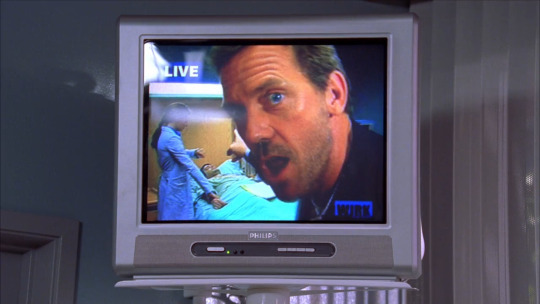
house versus altruism. unclear victor.
we are so in classic house md territory now. this episode is also another installment of the characters, house included, dancing around a vital revelation about his innerworkings that the audience is only privy to. this time, it's house's altruism. it's baked in there, i swear, and reaffirms my blanket belief that he cannot be a doctor that's so undone by failure without caring. again, he's such a failed misanthrope.
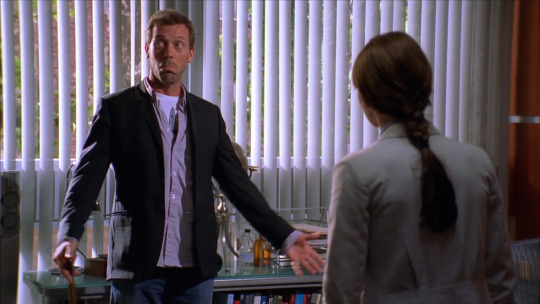
lots of me diagnosing house as an undercover good person below...
my leading question for 2x04 is why can't house contend with "good" people? and my answer is that he cannot find meaning in suffering, so he doesn't see bravery, or guilt, or outward altruism as meaningful. to house, these are words, but he's not introspective enough to realize that he's practicing the actions that make up love by saving patients. this says nothing of his interpersonal relationships. that's a different, bigger fish.
i think i've said this before, but if house hated people so much, he would have holed himself up in a research lab. he can't fool me. his belief that we have an "evolutionary imperative" to only care about those closest to our inner circle is completely defeated by his career choice. he simply wouldn't be a doctor if that were true. and when the patient, dr. charles park, a TB expert stationed in africa, asks if house "just has a problem with hope?" that hits the nail on the head. house fears hope because it could lead him, and others, astray; it prompts people to look for pointless meaning in suffering, suffering that a doctor ought to prevent (in his opinion).
of course, this manifests in him chewing out charles and all he stands for. charles campaigns to pharmaceutical companies, begging them to send the drugs to the populations in dire need, and has become a medical celebrity as a result.
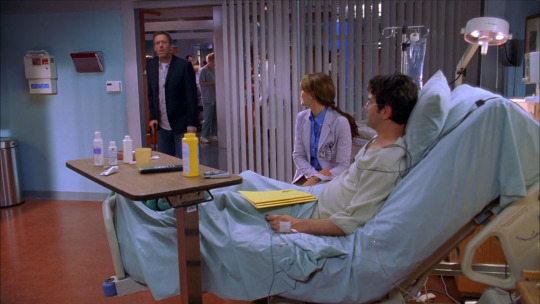
when charles does, in fact, get diagnosed with TB, he decides he won't take any treatment to make a point. naturally, house finds this absolutely insane, and decides to make charles' experience with TB as "authentic" as possible - raising the temperature of his room, taking his cellphone and tv, etc. house is daring charles to find meaning in this excessive suffering. he cannot accept that this is an act of self-sacrifice and altruism and wants to reach charles' limit.

but this is where the brilliance of the episode title and premise come into play! both charles and house are practicing altruism here; both versions are flawed. if charles doesn't take the treatment, he dies, house fails, and the cycle that plagues house repeats. if charles does take the treatment, he risks failing the underprivileged TB patients in africa.
but house is still being selfish, especially when he reveals to wilson later that what seriously bothered him off about charles were the "adulations" he received for his work. and when house threatens to expose charles' underlying, non-TB diagnosis after he dies of TB, charles folds. he prioritizes his image over the moral stance he claims he's willing to die for.
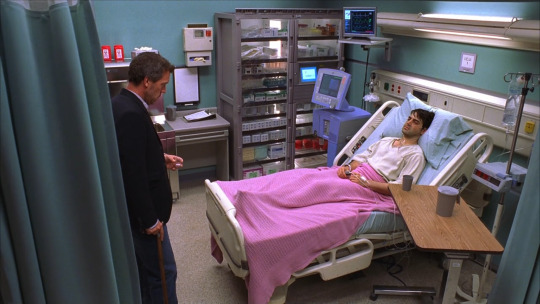
both charles and house are very uncompromising people, however, so neither realizes this about themselves or the other person.
the only person who intuitively comes closest to this realization is cameron, who has been honing her ability to see through house. while chase is irritated and vehemently ant-charles' altruism, cameron is clearly drawn to it (but within reason; this is season 2 cameron, after all). they could not have understood the "TB or not TB" of it all without her help, since she understood that, if charles was positive, it would inhibit their diagnostic process. in a way, she represents the grey area between charles and house's altruisms. brilliant of her, as always.

at the base level, however, it's image that gets house down. again, he admits to wilson that it's the attention that charles gets that pisses him off, it's an alarming moment of shortsightedness on house's part, but it's very honest. it's also rich because he's demanding sincerity after saying over and over again that he finds it annoying...and because wilson is the only one to hear it. that's probably why he looks at him Like This:
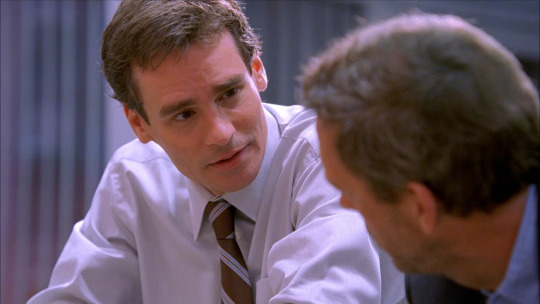
this is also a nice season 1 throwback to how house used to use wilson as a confession soundboard. i love their vulernability.
in keeping with house's distaste for concerns over image, i think a lot of this episode amounts to more association with house and god. for one thing, house's inability to find meaning in suffering implies that he is a kind god-figure. very NOT catholic, which, the most i watch, the more significant that feels to his relationship with chase. despite the superfluous pain he puts patients through to arrive at their diagnosis, he thinks that to suffer under a mystery diagnosis is cruel. his own diagnosis was a mystery, and it has brought him suffering ever since. this is also why he has a problem with self-sacrificing tendencies. see, it fits!
but there's a brief conversation in the elevator between house and the fellows that takes this a step farther. charles is concerned with the optics/visuals of his work - he has to be, to an extent - which is solely TB (earlier in the episode, house makes a slight at medical specialists). house's work is more all-encompassing, and it's this broad-spectrum outlook that allows the team to discover the microscopic tumor, the not TB lurking under the real TB.

when the fellows resist this diagnosis at first, house asks them: "how do you prove something exists if you can't see it? does god exist? does the wind blow?"
foreman's reply: "we know because the leaves move."
they have been relying on the optics/visuals/image of this case that it's impeded their ability to find the root cause. daringly, it seems like 2x04 is somewhat discrediting what charles does. in this association, house works invisibly; in this ongoing characterization of house as god that takes us all the way to the series finale, house is god and wields god's invisible hand. they remove the "invisible" tumor.
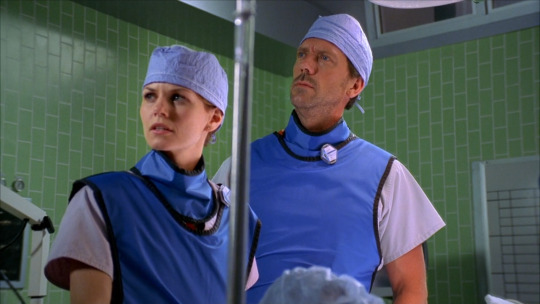
if you wanna get really into the house-as-god weeds (my favorite weeds), the fact that chase is the one to remove the tumor, with his religious history and habit of "kissing house's ass," feels very significant. there's something worship-esque about his specialty, being the most hands-on and Doing The Work whereas house avoids directly interfacing with patients at all costs.
so, when we see charles receive the adoration of all the camera flashes, and house observing from above, we can extrapolate that charles' insistence on image (however necessary to his altruism), is textually lesser than house's. god works invisibly.
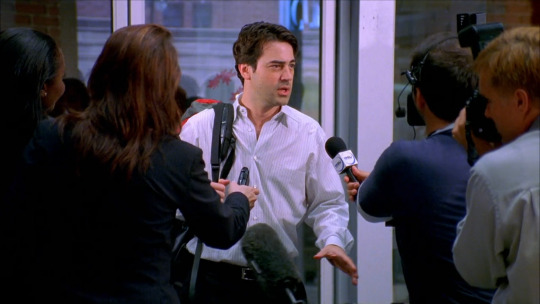

my last point is about how house then undercuts his own anti-image manifesto by being at least a little jealous of charles and by insisting on image's impact in the world. he tells cameron, through some clinic patient shenanigans, that "we are who people think we are." he demonstrates that he gets special, sympathetic treatment because of his disability by stepping on a stranger's toe with his cane (i won't get into who that stranger was lol this post is too long).
this is, of course, superficially true, that our assumptions, stereotypes, and image-obsessed minds create narratives about people (except they don't often end in sympathy, unfortunately). but this is another example of how black and white house is - when people get to know you, after you let them get to know you, then that image becomes full and true.
house almost never does this. i can't remember exactly when (though i think it's in season 2), but wilson makes the damning and hurtful accusation that house hides behind his disability and chronic pain to avoid any truth and sincerity. harsh as this might be, it's not untrue. house's defenses are so tall and unyielding that he can't see an alternative, however.
this one went a bit off the rails!! there's even more to say, i'm sure, but more than anything this episode really reminded me of why i came to love this show so much. it's so layered and full of it's titular character in the best way possible. i love shoving the fact that house does have a capacity for love right back in his obstinate face.
#this one is especially Text Forward lol so i apologize for that#if you couldn't tell he's my 2nd fav character#(which does not bode well for when a wilson episode hits)#speaking of#i can tell that they're charging wilson up again#he's been quiet since 2x02#house md#malpractice md#greg house#james wilson#allison cameron#robert chase#eric foreman#house md rewatch#rewatch 1#season 2
56 notes
·
View notes
Text
Navigating Medicare Enrollment with Ease: A Complete Guide

Enrolling in Medicare can feel like navigating a maze of paperwork and deadlines. This comprehensive guide is designed to simplify the process, with a specific focus on the new Medicare enrollment application. We’ll break down the different parts of the application, explain eligibility requirements, discuss enrollment periods, and offer tips to ensure a smooth and successful enrollment experience.
Understanding Medicare: Before diving into the application, it’s important to understand the basics of Medicare. Medicare is a federal health insurance program for:
Individuals aged 65 or older
Certain younger individuals with disabilities
People with End-Stage Renal Disease (permanent kidney failure requiring dialysis or a transplant, sometimes covered earlier than 65)
Medicare consists of different parts, each covering specific healthcare services:
Part A (Hospital Insurance): Covers inpatient hospital stays, skilled nursing facility care, hospice care, and some home health care.
Part B (Medical Insurance): Covers doctor’s visits, outpatient care, preventive services, and some medical equipment.
Part C (Medicare Advantage): Offered by private insurance companies approved by Medicare. These plans combine Part A and Part B coverage and may offer additional benefits.
Part D (Prescription Drug Coverage): Helps cover the cost of prescription drugs.
Who Needs to Fill Out a New Medicare Enrollment Application? You’ll need to complete a new Medicare enrollment application if you’re:
Turning 65: This is the most common reason for applying.
Becoming eligible due to disability: You may be eligible for Medicare before 65 if you’ve received Social Security disability benefits for 24 months.
Enrolling in Medicare Part B for the first time: Even if you’re already receiving Social Security benefits, you may need to actively enroll in Part B.
Changing Medicare plans: If you’re switching from Original Medicare to a Medicare Advantage plan or vice versa, you’ll likely need to complete a new application.
Re-enrolling after a break in coverage: If you previously had Medicare but it lapsed, you’ll need to re-apply.
Where to Get the New Medicare Enrollment Application: The official Medicare enrollment application is available through the Social Security Administration (SSA). You can access it:
Online: Visit the SSA website (ssa.gov) and search for “Medicare enrollment application.”
In-person: Visit your local Social Security office. It’s often helpful to call ahead and schedule an appointment.
By mail: You can request a paper application by calling the SSA’s toll-free number.
Completing the New Medicare Enrollment Application: A Step-by-Step Guide: The Medicare enrollment application can seem daunting, but breaking it down section by section makes it manageable. Here’s an overview of the information you’ll need to provide:
Personal Information: This includes your name, Social Security number, date of birth, address, and phone number.
Medicare Coverage Information: You’ll need to indicate which parts of Medicare you’re applying for (Part A, Part B, or both).
Health Insurance Information: Provide details about any other health insurance coverage, such as employer-sponsored insurance. This is crucial as it can affect your Medicare enrollment and coverage.
Employment Information: You may be asked about your current or past employment history, as this can impact your eligibility for certain Medicare benefits.
Signature: You’ll need to sign and date the application.
Key Considerations and Tips for a Smooth Enrollment:
Enrollment Periods: Understanding Medicare enrollment periods is critical. Failing to enroll during the appropriate period can result in penalties or delayed coverage. The Initial Enrollment Period (IEP) is a 7-month period surrounding your 65th birthday. Special Enrollment Periods (SEPs) are available for certain situations, such as losing employer-sponsored health insurance. The General Enrollment Period (GEP) runs from January 1st to March 31st each year.
Supporting Documentation: Gather all necessary documentation before starting the application. This may include your Social Security card, birth certificate, and any proof of other health insurance coverage.
Review Carefully: Double-check all information on the application for accuracy before submitting it. Errors can cause delays in processing.
Keep Copies: Make copies of the completed application and all supporting documents for your records.
Deadlines: Pay close attention to deadlines and submit your application well in advance to avoid potential penalties.
Seek Assistance: If you need help completing the application, consider consulting with a Medicare counselor or specialist. These professionals can also help you navigate the complex claim submission process to ensure your application is processed smoothly.
After Submitting Your Application: Once submitted, you’ll receive a Medicare welcome packet and your Medicare card. Review the information carefully and keep your card in a safe place.
Staying Informed: Medicare rules and regulations can change, so staying informed is crucial. Subscribe to updates from Medicare.gov to stay current.
Medicare Enrollment Application for Medical Coding Companies:
For medical billing outsourcing services or revenue cycle outsourcing companies seeking to become Medicare-approved providers or suppliers, enrolling in Medicare requires submitting the CMS-855 forms. These forms differ based on the type of services offered and ensure compliance with Medicare regulations, allowing the company to receive reimbursements for charge capture services and medical coding.
To complete the application, companies need to provide business details, National Provider Identifier (NPI), Tax Identification Number (TIN), and ownership information. The Centers for Medicare & Medicaid Services (CMS) conducts a screening process to verify credentials and prevent fraud.
Timely and accurate submission of the Medicare Provider Enrollment, Chain, and Ownership System (PECOS) application ensures smooth claim processing and reimbursement. Partnering with revenue cycle management outsourcing companies or Medicare enrollment specialists can streamline this process, enabling smooth claim submission and uninterrupted revenue flow.
Read more: https://www.allzonems.com/new-medicare-enrollment-application/
#medical billing outsourcing services#claim submission process#revenue cycle outsourcing companies#charge capture services#revenue cycle management outsourcing companies#revenue cycle management services companies#outsource icd-10 coding services#denial management companies#outsourcing billing services#healthcare revenue cycle outsourcing#icd 10 coding services#outsourced revenue cycle management#outsource medical coding usa#charge entry services#medical record indexing services#outsource revenue cycle management services#payment posting services#medical billing services for small practices#hcpcs coding services#medical billing audit companies#medical coding agencies#medical billing and coding outsourcing#rcm outsourcing services#healthcare medical billing management solutions#medical coding audit services
0 notes
Note
In honor of the baby delivery question that was in honor of the menstrual pad question, how would AGSZC (+ the Turks and Rufus, ifyw) react if they were asked how babies are made?
Assuming a child asks?
Sephiroth: Pulls up a powerpoint presentation he claims to be kid friendly purely because he included a rainbow title with fun lettering. "When genetic material from two compatible donors combines through sexual intercourse *next slide is detailed medical diagrams* "The male reproductive organ releases sperm cells which propel through the vaginal canal at speeds of 0.2 to 0.3 meters per hour." *more infuriatingly anatomically correct diagrams* "Please, do not cry. This is a perfectly healthy and normal depiction of human birth. Look, the mother even appears happy. Perhaps she won't abandon her child."
Angeal: *sits down with a warm smile* "When two people love each other very much, they share a special kind of hug and decide to express that love in a physical way! Just like how a seed needs rich soil and tender care to grow into a beautiful flower, new life needs—*gasp*—"NO SEPHIROTH, PUT THOSE DIAGRAMS AWAY!"
Genesis: "Ah, like the goddess's tender embrace of morning dew upon spring flowers, two souls entwine in passion's dance, the sacred union of dawn and dusk, where heaven meets earth in passionate embrace. Shall I recite the poetry of the Kamasutra?" *Pulls out an actual book* *gets tackled by Angeal*
Reno: *takes a drag from his cigarette* "When two idiots forget to wrap it up, a screaming hell-spawn is born and they have to deal with it for 18 years."
Zack: "Okay buddy, let uncle Zack break it down for you nice and simple! So there's this thing that happens... like when you... uh... you know how when chocobos... and then they... but with people it's... and then... CLOUD HELP ME OUT HERE!"
Cloud: *turns bright red* "Well... um... so... there's this... thing? That happens? With... parts? And... uh....and then somehow the cells do something with other cells and....Oh! I know! My mom said something about the dragons bringing the babies down from the mountain caves, but only if you leave out a bowl of Nibel stew every full moon for nine months! And you can't forget to hang wolf fangs over your door or the mountain spirits might swap the baby with an evil entity which—" *Zack covers his mouth because the child is now crying*
Tseng: Is cheerful and sweet but makes no sense. "Much like how Shinra absorbs smaller companies, there's a delicate negotiation between two interested parties. When the proper paperwork—by which I mean copulation—is filed correctly, a new subsidiary—that is, a baby—begins development. Think of it as a very complex tea ceremony, where timing and precision are everything!"
Rufus: *stroking Darkstar while reading reports* "A specialized delivery service employs large storks to distribute infants to suitable households. The process is quite straightforward and requires no further elaboration."
*Tseng whispers urgently in his ear*
"...I'm being informed that sex is involved."
#ff7#ffvii#final fantasy 7#sephiroth#final fantasy vii#genesis rhapsodos#ff7 crisis core#zack fair#cloud strife#tseng#reno ff7#rufus shinra#crisis core headcanons#headcanons
105 notes
·
View notes
Text
in addition to being prone to an obvious naturalistic fallacy, the oft-repeated claim that various supplements / herbs / botanicals are being somehow suppressed by pharmaceutical interests seeking to protect their own profits ('they would rather sell you a pill') belies a clear misunderstanding of the relationship between 'industrial' pharmacology and plant matter. bioprospecting, the search for plants and molecular components of plants that can be developed into commercial products, has been one of the economic motivations and rationalisations for european colonialism and imperialism since the so-called 'age of exploration'. state-funded bioprospectors specifically sought 'exotic' plants that could be imported to europe and sold as food or materia medica—often both, as in the cases of coffee or chocolate—or, even better, cultivated in 'economic' botanical gardens attached to universities, medical schools, or royal palaces and scientific institutions.
this fundamental attitude toward the knowledge systems and medical practices of colonised people—the position, characterising eg much 'ethnobotany', that such knowledge is a resource for imperialist powers and pharmaceutical manufacturers to mine and profit from—is not some kind of bygone historical relic. for example, since the 1880s companies including pfizer, bristol-myers squibb, and unilever have sought to create pharmaceuticals from african medicinal plants, such as strophanthus, cryptolepis, and grains of paradise. in india, state-created databases of valuable 'traditional' medicines have appeared partly in response to a revival of bioprospecting since the 1980s, in an increasingly bureaucratised form characterised by profit-sharing agreements between scientists and local communities that has nonetheless been referred to as "biocapitalism". a 1990 paper published in the proceedings of the novartis foundation symposium (then the ciba foundation symposium) spelled out this form of epistemic colonialism quite bluntly:
Ethnobotany, ethnomedicine, folk medicine and traditional medicine can provide information that is useful as a 'pre-screen' to select plants for experimental pharmacological studies.
there is no inherent oppositional relationship between pharmaceutical industry and 'natural' or plant-based cures. there are of course plenty of examples of bioprospecting that failed to translate into consumer markets: ginseng, introduced to europe in the 17th century through the mercantile system and the east india company, found only limited success in european pharmacology. and there are cases in which knowledge with potential market value has actually been suppressed for other reasons: the peacock flower, used as an abortifacient in the west indies, was 'discovered' by colonial bioprospectors in the 18th century; the plant itself moved easily to europe, but knowledge of its use in reproductive medicine became the subject of a "culturally cultivated ignorance," resulting from a combination of funding priorities, national policies, colonial trade patterns, gender politics, and the functioning of scientific institutions. this form of knowledge suppression was never the result of a conflict wherein bioprospectors or pharmacists viewed the peacock flower as a threat to their own profits; on the contrary, they essentially sacrificed potential financial benefits as a result of the political and social factors that made abortifacient knowledge 'unknowable' in certain state and commercial contexts.
exploitation of plant matter in pharmacology is not a frictionless or infallible process. but the sort of conspiratorial thinking that attempts to position plant therapeutics and 'big pharma' as oppositional or competitive forces is an ahistorical and opportunistic example of appealing to nominally anti-capitalist rhetoric without any deeper understanding of the actual mechanisms of capitalism and colonialism at play. this is of course true whether or not the person making such claims has any personal financial stake in them, though it is of course also true that, often, they do hold such stakes.
540 notes
·
View notes
Text
If it isn't already obvious, I work in utilization management. For those that don't know, it's a department that exists in most hospitals with the single minded purpose of getting health insurance companies to pay their due.
It's usually staffed by a lot of overworked nurses and one or two physicians, usually doing UM alongside actual clinical practice.
The nurses use whats in the patient's chart to justify the diagnostic code. They then upload those clinicals to the insurance company's portal, or fax them over.
Then, if we're lucky, a human being compares the clinicals with the MCG or other clinical standard guidelines and decides whether or not the chart justifies the diagnosis and treatment.
If we're not lucky, it's UHC which uses an automated system with a 90% error rate that denies 1/3 of the claims they receive.
In that case our nurses, who have to do this and so much more for about 90 patients a day *each*, have to go back in and highlight the criteria and hope it escalates to a human being.
The denial will usually be upheld.
So the case is forwarded to a contracted consultant company that staffs physician advisors. Their job is to narrow down exactly what needs to be done to beat the insurance company at their own game. The hospital pays for this service. Sometimes it works.
Often it doesn't, and the denial is still upheld.
So it goes to peer to peer. This means one of our doctors will have a phone call with a doctor on staff at the insurance company. There is no guarantee their doc will know anything about the specialty involved. I've seen OBGYNs make final calls on psych cases. This is the last chance.
Sometimes the physician on staff at the insurance company has a heart, and remembers what they got into medical school for. But often they have only a few minutes to make a judgement before the next peer to peer, and they have a quota of denials to maintain to keep their jobs.
So usually it's denied, and that's it. There's nothing else to do. The insurance company smugly gloats about protecting consumers from overuse of healthcare resources, the hospital bills the patient directly hoping to recoup something from it (even giving the patient services to help reduce their bill) and the patient is fucked at best, forgoes life saving care at worst.
All of that for such a shit ending. All of that money, time, administrative resources, look at it. Look at how many people are employed in the attempt to get insurance companies to pay and how many are employed to prevent it. There is so much bloat in the industry around this one thing, this one process, and it all goes back into the already inflated bill.
I go through insurance communications, I open the medical record with a photo of a child undergoing chemo. She's so small and so brave, smiling for the camera. Weeks of fighting back and forth to guarantee her care until one day I open it to forward yet another denial, and see the big gray 'deceased' tag under her now black and white photo. And I take a minute, I cry, I forward the fax, and I continue on. And this exact scenario repeats at least twice month.
We don't have to live this way. We don't have to.
#And I know I'm biased towards the hospital because I work for them but the hospital is not innocent in this either#Overworked physicians miss charting important vitals and communication in the medical record that fucks this process up
95 notes
·
View notes
Text
The Overlapped AU [Aka Superhumans disguisted as Dinner Theater workers]
The Owners

The Managers (Engineer & the HR person)

The Waiters

The Security
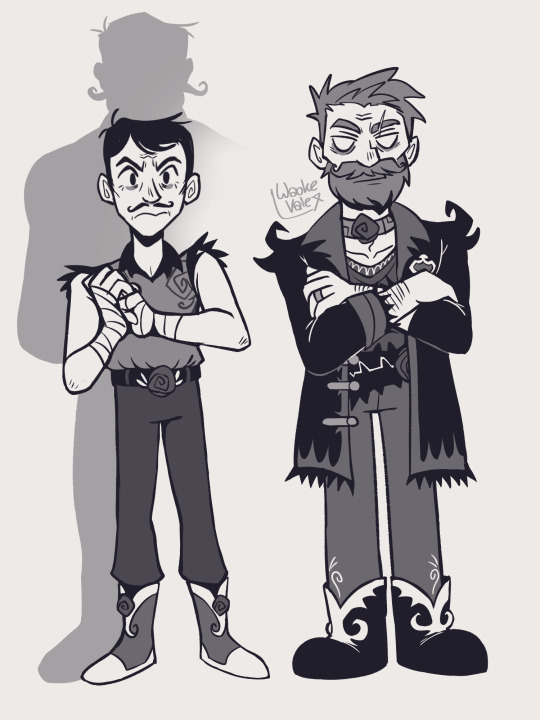
The Performers (Wes is mostly on cleaning duty though)

The Kitchen staff (the others are usually tasked to help, though very few are actually trusted at all times to be there)

The Bartender and the Host

The Dishwashers
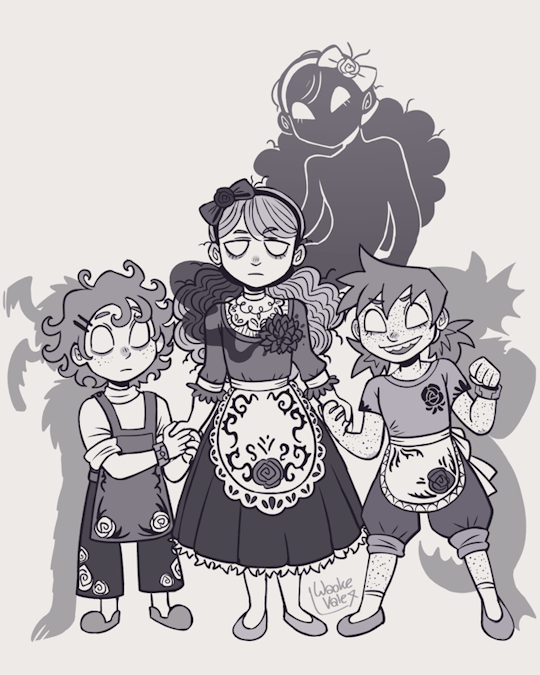
The Clerk & The Supplier

So this AU came to me upon a dream, and I just had to make it real...
The synopsis below:
The event of April 17th 1906 does happen, however instead of Charlie and Maxwell being kidnapped into the Constant, the Constant overlaps with the real world and spreads itself onto Earth.
Charlie and Maxwell in the process become corrupted and have to hide away temporarily. Both of them soon began to hear strange voices, source of which neither is quite sure, telling them, compelling them to hide the corruption's effect from the publicity, for the time being.
They come to a mutual realization they have to fix this mess somehow and hunt down any and all corrupted by the tome, by any means necessary.
(Maxwell still has codex umbra, but it is sealed shut for the time being until he's sure it won't spread more if Their influence. )
But the corruption didn't just appear out of nowhere, it's been leaking way long before Maxwell found the Codex, if to a less prominent extent.
Thus, in few years passing, they form a Dinner Theater, a rather inconspicuous establishment from the first glance. Very quickly they began "hiring" employees, which in reality means tracking down and blackmailing those who have been corrupted but not fully lost themselves to its effects, in order to hunt those who had.
Winona was against the idea at first, as she found out. But seeing the effects of corruption first hand, she quickly had a change of heart and integrated herself into Charlie's new environment.
Eventually they gathered a rather generous amount of people. Once a person's proven to be trustworthy to a point, they're give higher positions in the company.
However those who aren't, are likely to be shunned or "fired" which...you could probably guess what that means.
Many of these people gradually come to terms with the reality of their situation and accept their newfound purpose, being thankful that at least they still have a roof over their head and a warm meal, instead of being viewed as monsters or outcasts to the greater society.
(Wilson though, can't quite accept this notion. He keeps claiming that "this is just a big misunderstanding, I'm just a normal guy!" Yet the truth could be far from it.)
When Maxwell and Charlie hear of the danger looming, they immediately inform their "staff" of the matter. Those who are more experienced in combat come along to face whatever opponent may cross them, while those who aren't, stay behind, to be an additional aid or a medic in case the battle gets too intense.
Whenever any suspicion arises in the town about the shady business going on in that particular building, the two owners alongside their employees practically gaslight anyone and everyone into believing they're but the most regular entertainment center.
The characters who have either willingly or unwillingly lost their humanity, mostly in the physical sense, are given special devices constructed of Thulecite and bits of nightmare fuel (made by Winona, Wicker and the main two), which effectively hide away their true identity, or surpress the effects of their ailment.
There's also a few other people important to this story, especially the One, which even Charlie and Maxwell refer to as "The Boss", though what many most recent hires don't know, is that there's someone who's in a position much higher than the owners themselves, controlling their every move.
Correlating to that, another person, or rather, a set of people per se, working for a much different cause. Though most of them are "people" in only a visual sense of the word.
And while, there might be someone inside the well-known around town diner, who just might be more than what appears on the surface, literally and metaphorically this time.
__________
If you're interested to learn more about this AU, do let me know. If you have any questions, I'm happy to hear and answer them!
#dst#don't starve#don't starve together#dst au#dst charlie#dst maxwell#dst wilson#dst willow#dst winona#dst wickerbottom#dst wolfgang#dst woodie#dst wes#dst wigfrid#dst wx78#dst woodrow#dst wormwood#dst wendy#dst webber#dst wurt#dst wortox#dst wanda#dst walter#dst warly#dst abigail#the overlapped au
672 notes
·
View notes